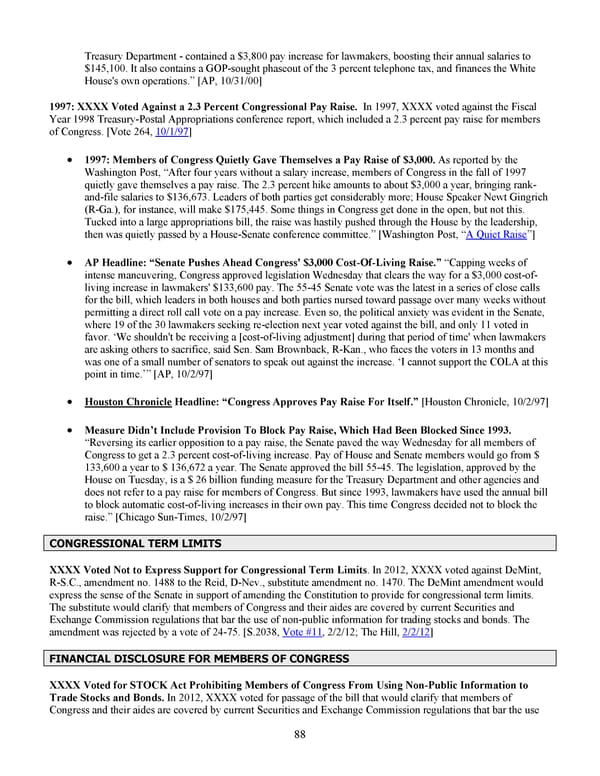Treasury Department - contained a $3,800 pay increase for lawmakers, boosting their annual salaries to $145,100. It also contains a GOP-sought phaseout of the 3 percent telephone tax, and finances the White House's own operations.” [AP, 10/31/00] 1997: XXXX Voted Against a 2.3 Percent Congressional Pay Raise. In 1997, XXXX voted against the Fiscal Year 1998 Treasury-Postal Appropriations conference report, which included a 2.3 percent pay raise for members of Congress. [Vote 264, 10/1/97] 1997: Members of Congress Quietly Gave Themselves a Pay Raise of $3,000. As reported by the Washington Post, “After four years without a salary increase, members of Congress in the fall of 1997 quietly gave themselves a pay raise. The 2.3 percent hike amounts to about $3,000 a year, bringing rank- and-file salaries to $136,673. Leaders of both parties get considerably more; House Speaker Newt Gingrich (R-Ga.), for instance, will make $175,445. Some things in Congress get done in the open, but not this. Tucked into a large appropriations bill, the raise was hastily pushed through the House by the leadership, then was quietly passed by a House-Senate conference committee.” [Washington Post, “A Quiet Raise”] AP Headline: “Senate Pushes Ahead Congress' $3,000 Cost-Of-Living Raise.” “Capping weeks of intense maneuvering, Congress approved legislation Wednesday that clears the way for a $3,000 cost-of- living increase in lawmakers' $133,600 pay. The 55-45 Senate vote was the latest in a series of close calls for the bill, which leaders in both houses and both parties nursed toward passage over many weeks without permitting a direct roll call vote on a pay increase. Even so, the political anxiety was evident in the Senate, where 19 of the 30 lawmakers seeking re-election next year voted against the bill, and only 11 voted in favor. ‘We shouldn't be receiving a [cost-of-living adjustment] during that period of time' when lawmakers are asking others to sacrifice, said Sen. Sam Brownback, R-Kan., who faces the voters in 13 months and was one of a small number of senators to speak out against the increase. ‘I cannot support the COLA at this point in time.’” [AP, 10/2/97] Houston Chronicle Headline: “Congress Approves Pay Raise For Itself.” [Houston Chronicle, 10/2/97] Measure Didn’t Include Provision To Block Pay Raise, Which Had Been Blocked Since 1993. “Reversing its earlier opposition to a pay raise, the Senate paved the way Wednesday for all members of Congress to get a 2.3 percent cost-of-living increase. Pay of House and Senate members would go from $ 133,600 a year to $ 136,672 a year. The Senate approved the bill 55-45. The legislation, approved by the House on Tuesday, is a $ 26 billion funding measure for the Treasury Department and other agencies and does not refer to a pay raise for members of Congress. But since 1993, lawmakers have used the annual bill to block automatic cost-of-living increases in their own pay. This time Congress decided not to block the raise.” [Chicago Sun-Times, 10/2/97] CONGRESSIONAL TERM LIMITS XXXX Voted Not to Express Support for Congressional Term Limits. In 2012, XXXX voted against DeMint, R-S.C., amendment no. 1488 to the Reid, D-Nev., substitute amendment no. 1470. The DeMint amendment would express the sense of the Senate in support of amending the Constitution to provide for congressional term limits. The substitute would clarify that members of Congress and their aides are covered by current Securities and Exchange Commission regulations that bar the use of non-public information for trading stocks and bonds. The amendment was rejected by a vote of 24-75. [S.2038, Vote #11, 2/2/12; The Hill, 2/2/12] FINANCIAL DISCLOSURE FOR MEMBERS OF CONGRESS XXXX Voted for STOCK Act Prohibiting Members of Congress From Using Non-Public Information to Trade Stocks and Bonds. In 2012, XXXX voted for passage of the bill that would clarify that members of Congress and their aides are covered by current Securities and Exchange Commission regulations that bar the use 88
 HRC vote skeleton Page 97 Page 99
HRC vote skeleton Page 97 Page 99